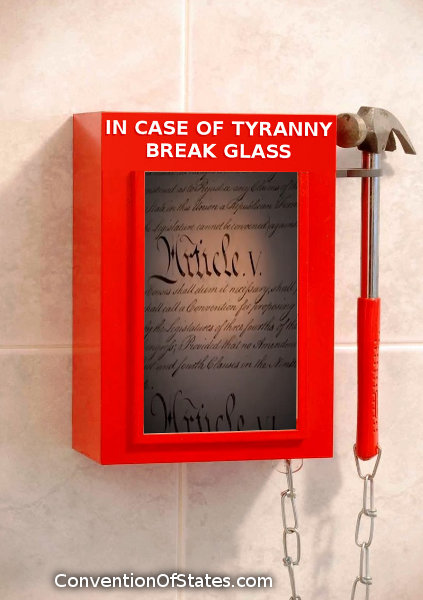
Posted on 02/04/2015 7:05:43 AM PST by cotton1706
Any amendment proposals coming from a state convention must still receive 3/4th approval from the states - just as any amendment proposed by congress does. It is not a constitutional convention it is a convention of states to propose amendments.
ping
Yes there is.
Counting should proceed based on the topic of the "Call".
A convention for proposing amendments to limit the federal govt would not be the same "bucket" or count as a leftist convention to propose an amendment to abolish the 2nd. If the left goes for the latter, good luck to them... they'll need it cause it will never get anywhere. The former, to limit the federals, *IS* making headway even here in MA.

The Constitutional process described here is just the officially prescribed process for doing this. Other means aren't prohibited. It comes down to political power. Once 3/4 of the states demand a particular Constitutional amendment, they'll get it regardless of other details.
The ABA recommended that when states submit an application for an Amendments Convention, they should list all states that had applied for a similar subject. This was to protect the states, not Congress, in the tabulating function. The ABA also recommended a four year standard for timeliness.
Since 1973, a number of people in Congress have submitted bills to enact the ABA's recommendations. The most recent one was in 1991 when Orrin Hatch submitted a bill, but it never got out of the Senate Judiciary Committee.
The reason Congress has assiduously avoided legislating on this topic is that it would give the states, via their attorneys general, the standing to challenge this in federal court.
York mentions the Walker lawsuit, which I edited for Bill Walker. Walker was dismissed by Judge John Coughenor citing "futility" and a lack of standing. Walker wasn't a state. His appeals to higher federal courts went unheeded. This was unfortunate, because Walker's brief was a law school level course on Article V. I learned a lot from editing it.
The problem is that Congress and the federal courts believe in both the Single Subject Standard and the Contemporaneousness Standard because both are rooted in contract law and were even observed under the Articles of Confederation.
There is a small minority of law school professors who believe that both standards are unconstitutional. According to their opinions, the subject doesn't matter, all Amendments Conventions are "general conventions" open to all subjects, and Congress should have called one back in 1895 or so. Attempts to get the federal courts to rule on this issue have been "futile", as Judge Coughenor said in his ruling.
Applications for an Amendments Convention and ratifications of constitutional amendments used to be collated by the offices of the Speaker of the House and the Secretary of State at various times in our history. Today the Archivist of the United States handles both functions. Stivers' resolution now adds the Clerk of the House to this function, which is a good, solid pieces of procedure. As a rule the Archivist doesn't send a memorandum to Congress unless a threshold is reached: two-thirds for a convention, and three-fourths for ratification. This should permit Congress to stay abreast of this effort and not claim it was blindsided, as it was with the 27th Amendment's belated ratification in 1992.
The first act is for the Clerk of the House and the Archivist of the United States to synchronize their Excel spreadsheets. Once that is done, I would hope that Stivers would ask Congress to finally legislate those two standards into law for the sake of clarity. If one or more states objects, they can go to federal court and litigate under the grounds that Congress exceeded the bounds of Dillon v. Gloss (1921) and Coleman v. Miller (1939) in which the Supreme Court gave Congress broad power to regulate the amendatory process.
Yes. And an amendment for a way to impeach and remove federal judges who make laws from the bench in the guise of “constitutionality” which nullify state laws and constitutions.
Disclaimer: Opinions posted on Free Republic are those of the individual posters and do not necessarily represent the opinion of Free Republic or its management. All materials posted herein are protected by copyright law and the exemption for fair use of copyrighted works.